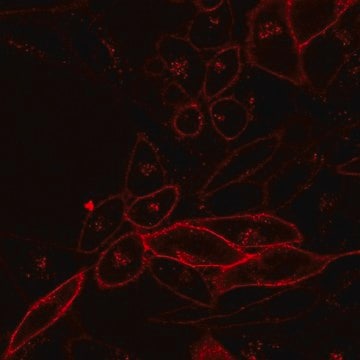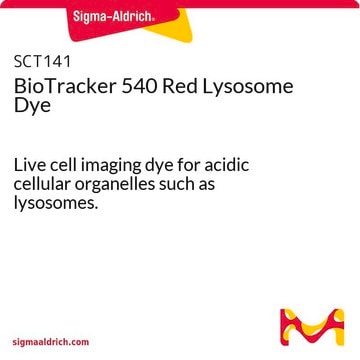This product will not prevent mitosis. However, if verapamil is used during the experiment (included in the kit to help with probe retention), it can inhibit mitosis in a dose-dependent manner.
SCT120
BioTracker 488 Green Nuclear Dye
Live cell imaging green nuclear staining dye with greater photostability than traditional blue fluorescent nuclear stains such as DAPI and Hoechst 33342.
Synonim(y):
Sonda do obrazowania jądrowego żywych komórek
Wybierz wielkość
1650,00 zł
Przewidywany termin wysyłki02 kwietnia 2025Szczegóły
Wybierz wielkość
About This Item
1650,00 zł
Przewidywany termin wysyłki02 kwietnia 2025Szczegóły
Polecane produkty
metody
cell based assay: suitable
metoda wykrywania
fluorometric
Warunki transportu
ambient
Opis ogólny
The BioTracker 488 Green Nuclear Dye is a cell-membrane permeable green fluorescent DNA dye that specifically stains nuclei in live or fixed cells. It has excellent specificity for DNA without the need for a wash step, and it has low toxicity for live cell imaging. The dye is supplied with a vial of verapamil, an efflux pump inhibitor that may improve probe retention and live cell staining in certain cell types.
Note: BioTracker Nuclear Dyes also shows blue fluorescence in the DAPI channel, and may not be suitable for multicolor imaging with blue probes.
Spectral Properties
Absorbance: 500nm
Emission: 515nm
Zastosowanie
Cell Imaging
Live Cell Dye
Komponenty
2) 1 vial of 100µL Verapamil HCL (100mM in DMSO) (CS224592)
Jakość
Absorbance: 500nm
Emission: 515nm
Postać fizyczna
Przechowywanie i stabilność
Note: Centrifuge vial briefly to collect contents at bottom of vial before opening.
Oświadczenie o zrzeczeniu się odpowiedzialności
Hasło ostrzegawcze
Warning
Zwroty wskazujące rodzaj zagrożenia
Zwroty wskazujące środki ostrożności
Klasyfikacja zagrożeń
Acute Tox. 4 Oral - Aquatic Chronic 2
Kod klasy składowania
10 - Combustible liquids
Certyfikaty analizy (CoA)
Poszukaj Certyfikaty analizy (CoA), wpisując numer partii/serii produktów. Numery serii i partii można znaleźć na etykiecie produktu po słowach „seria” lub „partia”.
Masz już ten produkt?
Dokumenty związane z niedawno zakupionymi produktami zostały zamieszczone w Bibliotece dokumentów.
Klienci oglądali również te produkty
-
Could the BioTracker 488 Green Nuclear Dye SCT120 prevent mitosis in 2D in vitro cultures?
1 answer-
Helpful?
-
-
Does the fluorescence intensity increase by chromosome condensation similarly to DAPI or Hoechst?
1 answer-
This product has not been tested for an increase in fluorescence intensity with chromosome condensation.
Helpful?
-
-
Is there any toxicity data available for extended (>48h) live cell staining?
1 answer-
The dye with verapamil showed no obvious toxicity in MCF-7 cells over the course of 72 hours. It may be different for different cell lines and different experimental conditions.
Helpful?
-
-
Is it possible to use SCT120 BioTracker 488 Green Nuclear Dye and PKH26 Red Fluorescent Cell Linker for in vivo applications, and what is their stability duration?
1 answer-
The PKH series of dyes are designed for membrane labeling and can be used to track cells through several divisions. The intensity of the dye decreases by half with each cell division, so the duration of visibility will depend on the cell division rate of the specific cell type.
Regarding SCT120 nuclear dye, there is limited information about the viability of cells after staining or the photostability of the dye once the cells have been stained.
Currently, there is no available information on the compatibility or effects of using SCT120 in conjunction with PKH26GL for dual staining of cells.
Helpful?
-
-
How can I optimize staining using SCT120?
1 answer-
The recommended protocol for using SCT120 is as follows:
1. Dilute the BioTracker™ Nuclear Dye from its 1000X stock solution to a working concentration of 1X in cell culture medium. To achieve this, one could add 1 µL of dye to 1 mL of culture medium. It is important to note that the optimal concentration of the probe may vary depending on the cell type. Optionally, verapamil can be included in the staining solution to enhance probe retention in live cells. The ideal concentration of verapamil will likely be different across cell types, and it is suggested to test concentrations ranging from 10-100 µM.
2. Discard the culture medium from the cells and replace it with the diluted BioTracker™ Nuclear Dye solution. Incubate the cells at 37°C for a minimum of 10 minutes.
To optimize staining, consider the following adjustments:
• Probe Dilution: Although the standard dilution is 1:1000, experimenting with other dilutions such as 1:500 or 1:750 could be beneficial. Observe the results and, if necessary, test additional dilutions to find the most effective concentration.
• Verapamil Concentration: The suggested range for verapamil is between 10 to 100 µM. Trial with two or three different dilutions within this spectrum may help to refine the staining process.
• Incubation Time: Initially, a 10-minute incubation is recommended. However, extending this period to 20, 40, or even 60 minutes at 37°C could improve staining results. If positive changes are noted, further experimentation with the duration may be warranted to optimize the staining signal.
It is vital to only change one variable at a time during these optimizations. Altering multiple factors simultaneously, such as the dye dilution, verapamil concentration, and incubation time, would make it difficult to identify which specific change led to any observed improvements. Additionally, checking cell viability before staining is advisable. Using Trypan Blue to determine cell viability might provide insights into the overall health and suitability of the cells for staining.
Helpful?
-
-
Will SCT120, BioTracker 488 Green Nuclear Dye SCT work with the FITC channel?
Will SCT120, BioTracker 488 Green Nuclear Dye SCT work with the FITC channel?
1 answer-
Yes, for SCT120 we do recommend analyzing the cells using the FITC channel.
Please refer to the product's data sheet, found in the DOCUMENTATION section of the Product Detail Page: https://www.sigmaaldrich.com/product/mm/sct120#product-documentation
Helpful?
-
-
Could you please provide the chemical structure and formula for BIOTRACKER 488 GREEN NUCLEAR DYE, if available?
1 answer-
This information is considered proprietary.
Helpful?
-
-
Hi I was wondering if this stain would work in a 100% alcoholic liquid, or whether it requires protons to fluoresce?
1 answer-
The dye has not been validated for DNA binding under 100% alcoholic liquid. It does not require protons to fluoresce.
Helpful?
-
Active Filters
Nasz zespół naukowców ma doświadczenie we wszystkich obszarach badań, w tym w naukach przyrodniczych, materiałoznawstwie, syntezie chemicznej, chromatografii, analityce i wielu innych dziedzinach.
Skontaktuj się z zespołem ds. pomocy technicznej


















